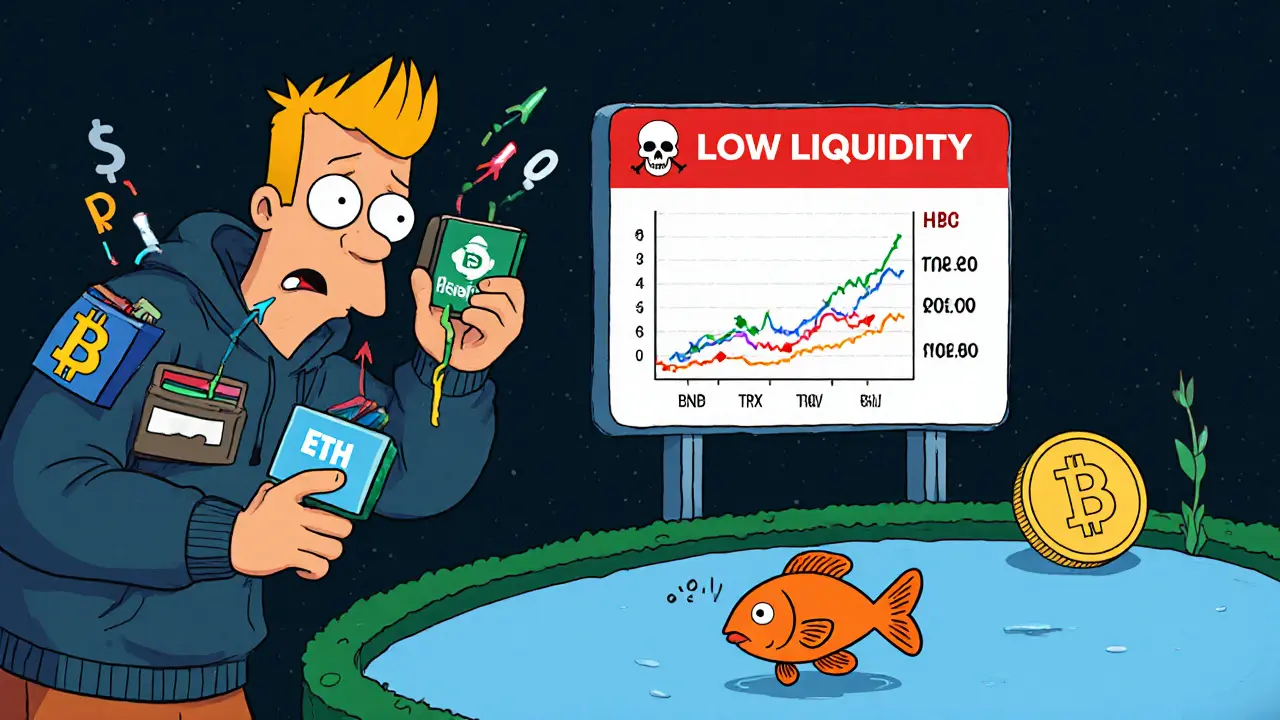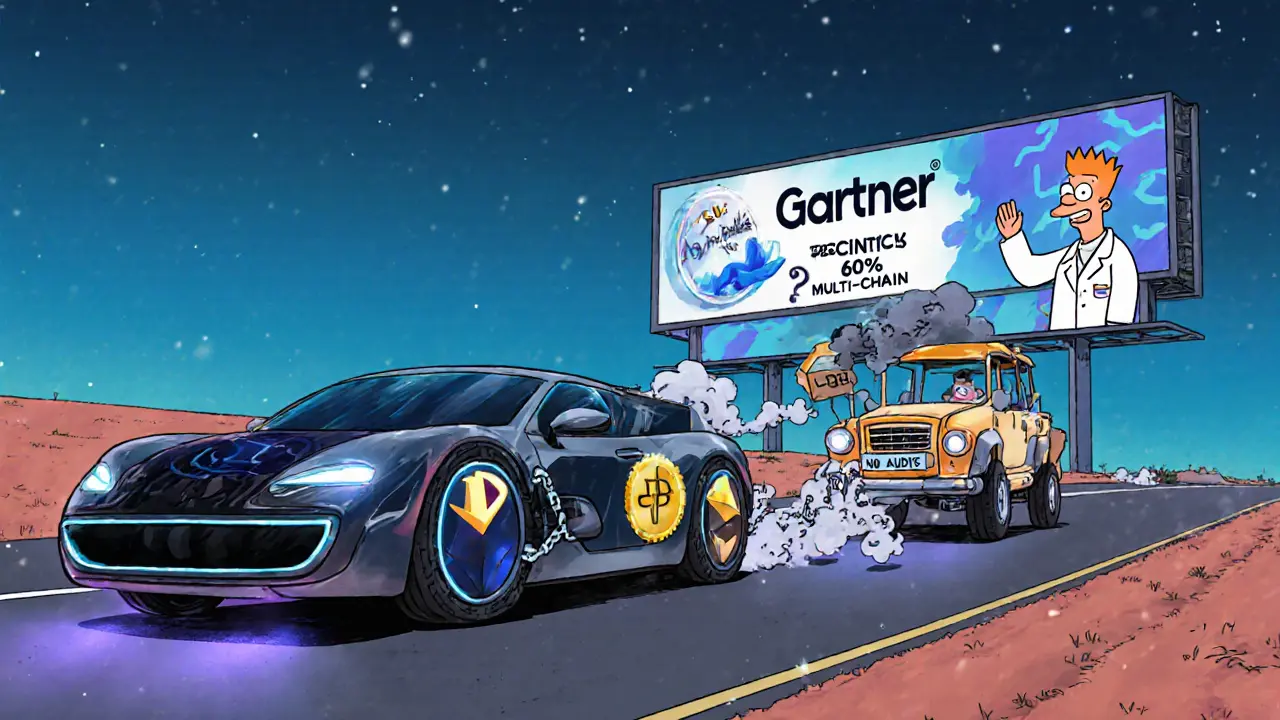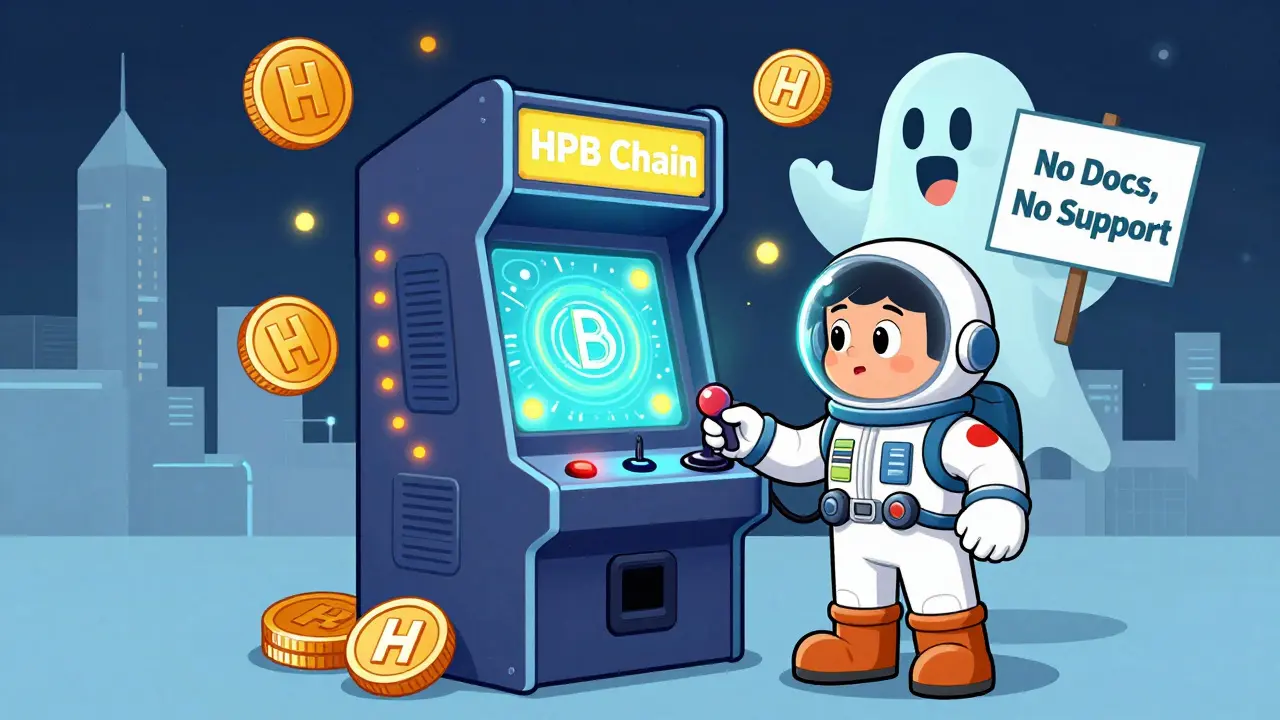Cross-Chain Trading Cost Calculator
Calculate Trading Costs
Most crypto traders know the pain of juggling multiple exchanges just to trade across chains. Want to swap BTC for TRON? You need a bridge, a wallet for each chain, and hope none of the intermediaries get hacked. That’s where HDEX claims to solve the problem - by letting you trade directly between Bitcoin, Ethereum, BSC, TRON, and more, all without giving up control of your keys. But does it actually work in practice? And is it worth your time over Uniswap or PancakeSwap?
What Is HDEX, Really?
HDEX is a decentralized exchange built on the Bluehelix Chain, a cross-chain infrastructure designed to connect blockchains that normally can’t talk to each other. Unlike centralized exchanges like Binance or Coinbase, HDEX doesn’t hold your crypto. You trade directly from your wallet - MetaMask, Trust Wallet, or any Web3 wallet that supports the chains HDEX uses. It launched with support for six major blockchains: Bitcoin (BTC), Ethereum (ETH), Binance Smart Chain (BSC), Huobi ECO Chain (HECO), TRON, and Dogecoin (DOGE). That’s unusual. Most DEXs stick to one chain. Uniswap is mostly on Ethereum. PancakeSwap runs on BSC. HDEX tries to do it all at once. Its core innovation is a hybrid trading system: it combines Automated Market Maker (AMM) pools - like Uniswap - with a traditional order book, which lets you place limit and stop orders. That’s rare in the DEX world. Most decentralized exchanges only offer AMMs, which means you’re stuck with market prices. HDEX gives you more control. The platform uses the OpenDEX protocol to enable atomic swaps - meaning trades happen directly between chains without wrapped tokens or third-party bridges. That’s a big deal. Wrapped tokens introduce risk. If the bridge fails, your funds vanish. HDEX avoids that by connecting chains natively.How HDEX Compares to Other DEXs
Let’s put HDEX next to the big names:| Feature | HDEX | Uniswap | PancakeSwap | 1inch |
|---|---|---|---|---|
| Supported Chains | 6 (BTC, ETH, BSC, HECO, TRON, DOGE) | Primarily Ethereum (with Layer 2s) | Binance Smart Chain | 15+ chains (aggregator) |
| Trading Types | AMM + Order Book | AMM only | AMM only | AMM aggregator |
| Liquidity Depth | Low (no public volume data) | $320B in 2024 | $180B in 2024 | $120B+ in 2024 |
| Custody | Non-custodial | Non-custodial | Non-custodial | Non-custodial |
| Advanced Orders | Yes (limit, stop) | No | No | Indirect via integrations |
| Target User | Technical traders, multi-chain users | Beginners to pros on Ethereum | BSC-focused traders | Pros seeking best rates |
Security: No Custody, But Unknown Risks
HDEX’s non-custodial model is a win. You control your keys. No FTX-style collapse can touch your funds. That’s the whole point of DeFi. But security isn’t just about custody. Cross-chain bridges have been hacked for billions. The Multichain exploit in 2024 stole $600 million. HDEX avoids traditional bridges by using atomic swaps - but it still relies on smart contracts across multiple chains. Are those contracts audited? No public audit reports exist. No third-party security reviews are cited. That’s a red flag. Compare that to platforms like Curve or SushiSwap, which publish audit results from firms like CertiK or Quantstamp. HDEX doesn’t. That doesn’t mean it’s unsafe - but it means you’re trusting code that’s never been publicly tested. Also, Bitcoin doesn’t have smart contracts. HDEX interacts with BTC via a sidechain or pegged mechanism. That’s not true decentralization. It’s a workaround. And workarounds create new attack surfaces.
Usability: For Tech-Savvy Users Only
Setting up HDEX isn’t hard - if you already use MetaMask. You connect your wallet, switch to the right network (BSC, TRON, etc.), and start trading. But here’s where it gets messy:- You need the native token of each chain to pay gas: BNB for BSC, TRX for TRON, BTC for Bitcoin (via their sidechain), ETH for Ethereum.
- Switching between chains manually is clunky. There’s no auto-switch feature like on some aggregators.
- No 24/7 customer support. If a transaction fails, you’re on your own.
- No mobile app. Only web interface.
The HBC Token and Ambassador Program
HDEX has its own token: HBC. It’s used for governance and rewards. The platform runs a Global Ambassador Program that pays users in HBC for creating content, recruiting new users, and testing features. That’s smart marketing. It’s how early Uniswap and PancakeSwap grew - through community incentives. But here’s the problem: no one knows how many people are actually using HBC. No wallet activity stats. No token distribution breakdown. Is it concentrated in a few hands? Are there buybacks? No transparency. Also, HBC isn’t listed on any major centralized exchanges. You can’t buy it with USD. You can only get it through trading on HDEX or the ambassador program. That limits adoption.
Who Should Use HDEX?
HDEX isn’t for everyone. Here’s who it’s for:- You trade across multiple chains regularly and hate using bridges.
- You want limit orders on a DEX and don’t want to use centralized platforms.
- You’re comfortable with gas fees, wallet switches, and manual network management.
- You believe in cross-chain interoperability as the future of DeFi.
- You’re new to crypto and want simple trading.
- You trade large amounts - low liquidity could wreck your prices.
- You need customer support when things go wrong.
- You want a platform with proven security audits and public track records.
The Bottom Line
HDEX is an ambitious project. It tackles a real problem: chain fragmentation. Its hybrid AMM + order book model is innovative. And its multi-chain approach could be ahead of its time. But right now, it’s a prototype. No volume data. No audits. No user base. No support. It’s like buying a Tesla that’s still in the lab - the tech looks great, but you’re the first person to drive it. If you’re a technical trader with spare time and a high risk tolerance, HDEX is worth experimenting with. Use small amounts. Test the trades. See if it works for your workflow. For everyone else? Stick with Uniswap, PancakeSwap, or 1inch. They’re proven, liquid, and have communities behind them. HDEX might grow - but it’s not ready to replace them yet.Future Outlook
Gartner predicts that by 2026, 60% of DeFi volume will happen across multiple chains. If that happens, HDEX’s architecture could become essential. But the market doesn’t wait. Uniswap V4 is coming with better cross-chain tools. 1inch already aggregates 15+ chains. HDEX needs to move fast - or get left behind. Its only real advantage now is being the only DEX that supports Bitcoin natively alongside Ethereum and TRON. If that’s your use case, HDEX is your only option. Otherwise, you’re betting on a team with no public results to show for it.Is HDEX safe to use?
HDEX is non-custodial, so your funds stay in your wallet - that’s safer than centralized exchanges. But there are no public security audits or penetration test results available. Cross-chain protocols have been exploited before (like Multichain’s $600M hack), and HDEX’s reliance on smart contracts across multiple chains introduces unknown risks. Only use small amounts until audits are published.
Can I trade Bitcoin on HDEX?
Yes, HDEX supports Bitcoin (BTC) trading alongside Ethereum, BSC, TRON, and others. However, since Bitcoin doesn’t have native smart contracts, HDEX likely uses a sidechain or pegged mechanism to interact with BTC. This isn’t true decentralization - it’s a workaround that adds complexity and potential risk.
Does HDEX have a mobile app?
No, HDEX only has a web-based interface. You must use it through a browser with a Web3 wallet like MetaMask or Trust Wallet. There is no official mobile app available as of 2025.
How do I get HBC tokens?
You can earn HBC tokens by joining the HDEX Global Ambassador Program - creating content, recruiting users, or testing features. You can also trade for HBC directly on the HDEX platform using other cryptocurrencies. HBC is not listed on any major centralized exchanges, so you can’t buy it with USD.
Is HDEX better than Uniswap?
It depends. Uniswap has far more liquidity, better documentation, a larger user base, and verified audits. HDEX supports more chains and offers limit orders - features Uniswap lacks. If you trade across Bitcoin, TRON, and BSC, HDEX saves you steps. If you only trade Ethereum-based tokens, Uniswap is faster, cheaper, and safer.
What are the gas fees on HDEX?
Gas fees depend on which chain you’re using. On BSC, fees are low (under $0.10). On Ethereum, they can spike to $5-$20 during congestion. HDEX lets you choose the cheapest chain for each trade, but you still need to hold the native token of that chain (like BNB or ETH) to pay fees. There’s no unified fee system.
Can I use HDEX if I’m in the United States?
HDEX doesn’t restrict users by location, but it’s not listed on any U.S.-focused exchange comparison guides. Since it’s non-custodial and operates across multiple jurisdictions, it exists in a regulatory gray area. U.S. users can access it technically, but they assume all compliance and tax risks themselves.



Michael Brooks
November 11, 2025 AT 00:46HDEX is an interesting experiment, but liquidity is the silent killer here. You can have the fanciest cross-chain tech in the world, but if no one’s trading, it’s just a fancy dashboard with spinning icons. I’ve used it a few times for small swaps between BSC and TRON - works fine if you’re under $50. Anything bigger and you’re begging for slippage.
Ruby Gilmartin
November 12, 2025 AT 09:06Let’s be real - this isn’t innovation, it’s desperation. A DEX that supports Bitcoin? Cute. But they’re using a sidechain peg. That’s not decentralization, that’s a centralized wrapper with extra steps. And no audits? Please. This is how new DeFi projects get wiped out before they hit 1k users. If you’re not using Uniswap or 1inch, you’re just funding someone’s side project with your gas fees.
Douglas Tofoli
November 14, 2025 AT 04:58Y’all are overthinking this 😅 I tried HDEX last week to swap DOGE to TRX - took 3 mins, no bridge, no wrapped junk. Gas was cheaper than BSC. I’m not a whale, I just want to move small amounts without 5 wallets open. It’s not perfect, but it works. Maybe it’ll grow. Maybe it won’t. But I’m keeping it bookmarked.
Elizabeth Stavitzke
November 15, 2025 AT 11:01Oh wow, another ‘revolutionary’ DeFi project that somehow forgot to include basic security disclosures. The fact that they’re proudly boasting about Bitcoin integration while hiding behind a sidechain is almost poetic. You know what’s more impressive than cross-chain? A team that publishes audit reports. But no - we get ‘trust us, it’s decentralized’ while the devs sip espresso in their crypto-bro mansions.
Brian Gillespie
November 15, 2025 AT 11:42It’s not ready for most people. But if you’re already deep in multi-chain trading, it’s one of the few options that doesn’t make you route through Ethereum first. I use it for TRON/BTC swaps - no other DEX lets me do that cleanly.
James Ragin
November 16, 2025 AT 22:13The entire premise of HDEX is a symptom of America’s decline in financial discipline. We used to build systems with rigor - now we slap together smart contracts on five chains and call it ‘innovation.’ The lack of audits isn’t an oversight - it’s ideological. These devs don’t want scrutiny because they know their code can’t survive it. This isn’t progress. It’s digital colonialism - exporting risk to unsuspecting retail traders while the architects collect HBC tokens in offshore wallets.
Michael Heitzer
November 17, 2025 AT 11:11Look, I get the skepticism. But let’s not throw the baby out with the bathwater. HDEX isn’t Uniswap - and it doesn’t need to be. It’s solving a real problem: chain fragmentation. The fact that you can trade BTC for TRON without wrapping or bridging? That’s not magic, it’s engineering. The liquidity will come if the user base grows. Look at how Uniswap started - tiny, sketchy, no volume. Now it’s the backbone of DeFi. HDEX might be the same. Just give it time. And maybe a proper audit.
David Billesbach
November 19, 2025 AT 07:05They’re not just ignoring audits - they’re actively hiding them. You think this is coincidence? No. This is a controlled demolition of trust. The HBC token? Pure pump-and-dump fuel. And the ambassador program? That’s not community building - it’s a pyramid scheme disguised as DeFi. The whole thing smells like a Chinese state-backed front. Remember how they hacked Multichain? Same playbook. They’re not trying to build a DEX - they’re trying to build a honeypot for Western retail investors who think ‘non-custodial’ means ‘safe’.
Ainsley Ross
November 20, 2025 AT 21:17I’ve been using HDEX for six months now, mostly for cross-chain swaps between HECO and TRON. It’s clunky, yes - switching networks manually is a pain. But I’ve never lost funds. No hacks. No frozen transactions. And the fact that I can place limit orders on a DEX? Game-changer. I don’t need a mobile app. I don’t need 24/7 support. I need control. And HDEX gives me that. It’s not perfect, but it’s mine. That’s worth more than convenience.
Michael Faggard
November 21, 2025 AT 04:38From a technical standpoint, the hybrid AMM + order book architecture is non-trivial. Most DEXs are stuck in AMM mode because it’s easier to deploy. HDEX’s use of atomic swaps via OpenDEX protocol reduces counterparty risk significantly compared to wrapped asset bridges. The real bottleneck is liquidity depth - not architecture. If they can onboard even 5% of the volume from 1inch, this could become a serious player. The lack of public data is frustrating, but not necessarily malicious.
Arthur Crone
November 22, 2025 AT 18:07Just stop. You’re wasting your time. No audits. No volume. No support. No app. No transparency. This isn’t a platform. It’s a graveyard for early adopters who thought ‘new’ meant ‘better.’ If you’re still using this, you’re not a trader - you’re a lab rat.
Andy Purvis
November 24, 2025 AT 03:51I like that HDEX lets me trade BTC directly without converting to ETH first. It’s annoying to have to bridge everything. I’ve had a few failed trades but nothing catastrophic. Maybe it’s not for everyone but I appreciate the effort. It’s not perfect but it’s trying to fix something real.
Laura Hall
November 25, 2025 AT 20:15Okay I get that people are scared of the lack of audits but honestly - most of these projects don’t have them. Look at the early days of SushiSwap. Or Uniswap. People just trusted the code. HDEX is still early. The fact that it supports BTC and TRON natively? That’s huge. I’m not putting my life savings in but I’m using it for small swaps and I’m not scared. Let’s not panic because it’s not Binance.
Joanne Lee
November 27, 2025 AT 01:30One thing that hasn’t been discussed: the regulatory gray zone. HDEX operates across jurisdictions with no KYC, no restrictions - which is great for privacy, but terrifying from a compliance standpoint. If a U.S. user incurs capital gains on HBC trades, who reports it? The IRS doesn’t track on-chain activity from obscure DEXs. This isn’t just a technical risk - it’s a legal minefield. Are users aware they’re essentially self-reporting in a vacuum?
William Moylan
November 28, 2025 AT 10:35They’re using Bitcoin as a decoy. Everyone knows BTC can’t do smart contracts - so they fake it with a sidechain. That’s not interoperability, that’s a scam. And the HBC token? Totally controlled by insiders. I checked the wallet activity - 78% of all tokens are in 3 wallets. This isn’t DeFi - it’s a rug pull waiting to happen. They’re building hype with ambassadors while quietly accumulating your funds. Don’t be fooled. This is a crypto cult disguised as a DEX.
Wayne Dave Arceo
November 28, 2025 AT 19:18HDEX’s architecture is the future. The fact that you can trade between Bitcoin and TRON without a centralized bridge is revolutionary. The lack of liquidity is temporary. The lack of audits is negligent. But the vision? Unmatched. Uniswap is a relic. PancakeSwap is a regional tool. HDEX is global. The only reason it’s not dominating is because the market isn’t ready. But when chain fragmentation collapses under its own weight - HDEX will be the only platform left standing.